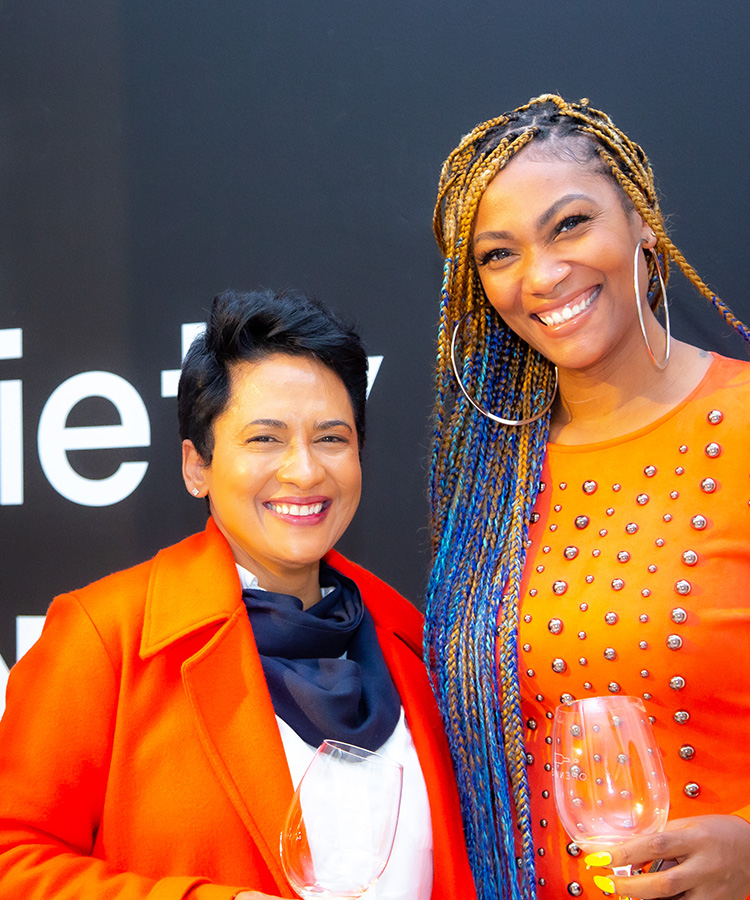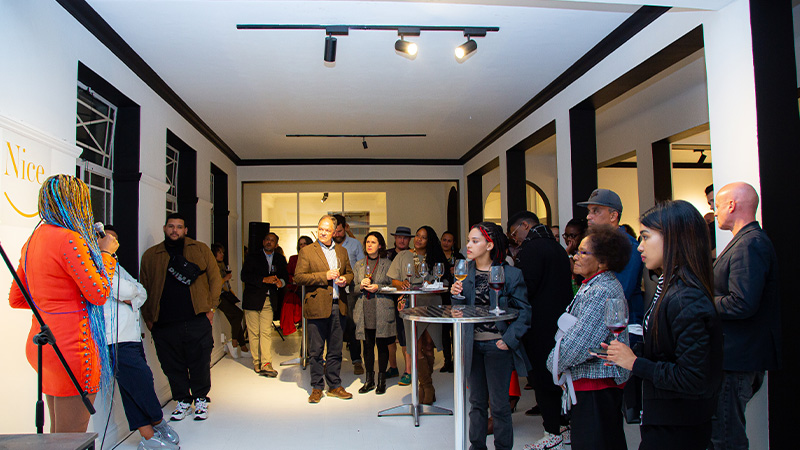
When Tahiirah Habibi founded The Hue Society in 2017, an organization determined to revolutionize the Black, Brown, and Indigenous wine enjoyment experience — no code-switching or assimilation required — she knew its message had to go global. It needed to go somewhere that epitomizes Black excellence and innovation. It needed to go to South Africa.
The seventh largest producer of wine in the world, Africa’s southernmost country boasts long, balmy summers, wet winters, and well-drained soils – ideal conditions for Cabernet Sauvignon and Chenin Blanc, South Africa’s best-beloved varietals.
But, as any wine lover knows, history and wine go hand-in-hand and South Africa’s history exemplifies just how complicated that relationship can be. The federal government’s segregationist policy, Apartheid, which existed from 1948–1994, excluded non-white citizens from civic life, education, and socioeconomic advancement opportunities.
No industry typified this systemic exclusion more than the wine industry where Black laborers never saw the fruits of their labor, often being paid illegally with leftover wine instead of currency under the “dop” system which led to widespread, generational poverty.
Today, although most of South Africa’s 300,000-strong wine industry laborers are BIPOC, and though the wine industry is one of the most forward-thinking in the country — growers often surpass Fairtrade standards and utilize innovative sustainable production practices — less than 65 of the country’s 536 wineries are owned and operated by people of color. And, less than 10 of those labels (roughly 2 percent) own the land on which their wines are produced.
“I wanted to shed light on what it means to be in that industry from their perspective,” Habibi says of The Hue Society’s first international chapter and the inspiration for this year’s Wine & Culture Fest. “Often, we assume that because South African wine is African, many of the winemakers must be people of color. However, only about 1 percent of people involved in the South African wine industry is Black,” Habibi says.
But that number is growing, and the shift in the industry is being led by a determined handful of BIPOC sommeliers, winemakers, and label owners determined to have their voices heard and their wine labels represented globally.
Changing the Face of South African Wine
One such voice is Ntsiki Biyela, founder of boutique label Aslina Wines, and the first Black female winemaker in South Africa. After studying viticulture and oenology at Stellenbosch University, Biyela became determined to create her own label, named in honor of her grandmother.
To raise funds for the brand, Biyela collaborated on a wine label with Napa Valley legend, Helen Keplinger, and, after establishing Aslina in 2016, won gold at the Michelangelo International Wine and Spirits Awards for her first red wine. In the years since Forbes has named her “A Winemaker to Follow” with Fortune’s Food & Wine crowning Ntsiki as one of the “Most Innovative Women in Food & Drink” in 2017. And, in 2021, Ntsiki won the Diversity and Transformation Award at the annual Wine Harvest Commemorative Event for her revolutionary work in South Africa’s wine industry.
Helping professionally elevate BIPOC voices like Biyela’s are organizations like The Hue Society, WITU (South African Wine Industry Transformation Unit), Wines of South Africa (a sponsor of the Wine & Culture Fest), and Vinpro, which offer educational aids for viticulturists, statistics, and comprehensive lists of Black-owned wine brands, and many white ally brands and producers in the industry.
Bosman Wines, South Africa’s oldest, boutique family winemaking operation, has a lineage of social and environmental responsibility; a culture of inclusion and empowerment is ingrained in its mission. In 2009, the Bosman family gave 26 percent of the company to their Black employees and began donating 2 percent of all sale proceeds to a fund for their laborers under the Bosman Adama Community Projects initiative. The transaction was the largest Black Economic Empowerment (BEE) deal and the largest land reform transaction in the industry’s more than 300-year-long history. And, in 2017, the family appointed Natasha Williams, a Black woman and founder of Lelie van Saron wines, as executive winemaker.
“There are so many white farmers and winemakers who are willing to help,” says Joseph Dhafana, a Zimbabwean sommelier and owner of Mosi Wines and Spirits, noting the production assistance offered to his label by Chris and Andrea Mullineux (Mullineux & Leeu Family Wines), and Riebeek Cellars.
More than equitable production practices, Habibi emphasizes international importation as vitally important to the success of Black-owned labels. “Consumers have the power to demand Black-owned brands, and I think we need to be more conscious of who we are supporting,” Habibi says, noting some brands falsely tout Black ownership for financial gain. “Ask, ‘Who is [this] benefitting?’ Be more curious about what you are drinking and where it comes from.”
Working hard with the government to bring Aslina Wines and other socially responsible South African labels to the global market is Mika Bulmash, founder and CEO of Wine for the World, an equitable wine importer representing winemakers of color and wines of impact. Given the country’s racially inequitable past, Wine for the World puts South African growers seeking representation through an extra rigorous vetting process. “We ask nosy questions about ownership, management and pay structure, sustainability, winemaking philosophy, among many others,” Bulmash says.
When Bulmash began importing over a decade ago, she sold many of the wines herself realizing that, if trade members and customers did not know what questions to ask, it was her job to show them how “equity, inclusion, and representation in the wine industry mattered.” Now, Bulmash says, “more consumers are asking important questions about equity and inclusion, and there is much more space for Black-owned brands to participate in the conversation and commerce.”
Celebrating South African Wine
Stateside, Habibi looks forward to celebrating the incredible achievements of the Black, Brown, and Indigenous innovators she has met in the South African wine industry at this weekend’s Wine & Culture Fest held August 11–14.
Kicking off Thursday’s event is a celebration of South Africa held at White Label Space, featuring traditional South African cuisine and wines. Not only will they be creating pairing menus, but they will also lead insightful discussions highlighting their personal experiences and those of South African sommeliers and importers attending the festival. DJ Pollux, an acclaimed musician, is also making the international trek, ensuring the event attendees are treated to a killer dance party after dark.
Throughout the weekend, guests will have the opportunity to sip socially responsible and BIPOC-owned wines and bubbles from South Africa including, Lelie van Saron, Bosman Wines, HER Adama Wines, and Tesselaarsdal Wines, as they dine and dance across Atlanta.
With a schedule full of luxury tasting experiences and a star-studded lineup of speakers, culinary, and wine experts on deck, this year’s festival is sure to emulate the Fest’s mission of “connecting Black excellence through our experiences of food, music, art, and fashion” with plenty of good vibes to go around.
Head to Wine & Culture Fest’s website to get your tickets and be sure to follow them on Instagram @wineandculturefest.
This article is sponsored by The Hue Society.


